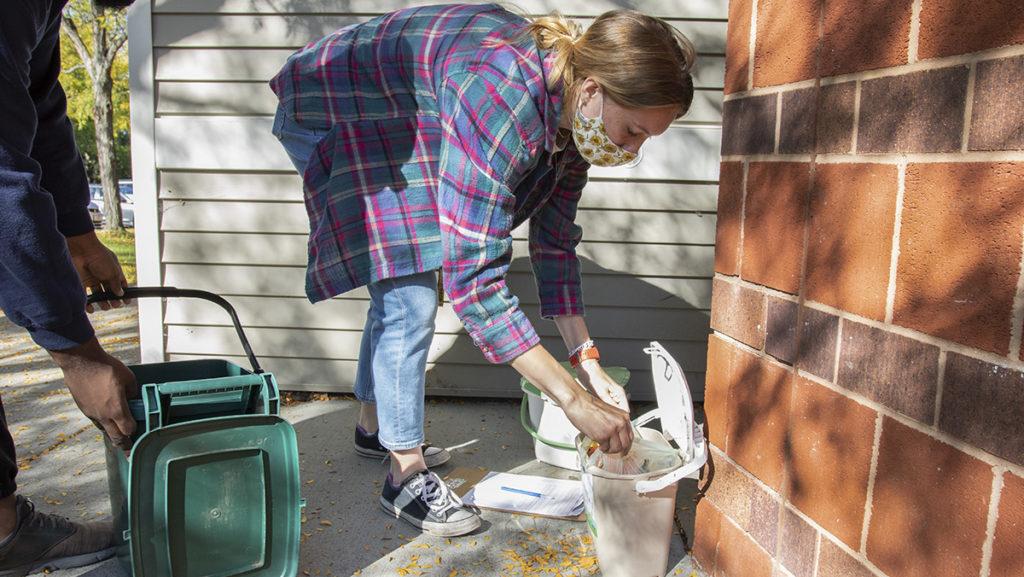The culture of environmentalism and sustainability has seeped into every aspect of life at Ithaca College — from the aesthetic of the clothes that students wear, to the water bottles they use, to the clubs that they join.
The college was named in the Princeton Review’s “Guide to Green Colleges” and was given a Green Rating of 98/99 for its sustainable initiatives in 2018. On campus, there are several organizations and offices dedicated to sustainability like Eco Reps, Environmentalists of IC, IC Impact and the Office of Sustainability and Energy Management. All of these are open to student involvement and some for student employment. The college has also banned the use of plastic straws and plastic bags, but increased its use of plastic silverware in dining halls as a COVID-19 precaution.
Another extension of the eco-friendly culture at the college has branched into students’ dietary choices. Vegan and vegetarian diets have risen in popularity among students as a more environmentally conscious option.
Senior Alex Rutkowski is the current president of Environmentalists of IC and said she is excited to start getting to work on campus and start some projects. Environmentalists of IC has hosted events in the past like environmentally friendly DIYS, clothing swaps and other events focused on being environmentally friendly. The club also helped organize a local climate strike in 2019, where hundreds of students gathered to show their passion for the cause.
“We always have the goal of education and activism,” Rutkowski said. “We strive to encourage students to use their voice to make institutional changes on the government level…We want students to recognize behaviors that benefit the environment and have them implement that in their lives as they see fit.”
Generation Z makes up a majority of the population of students at college. This generation is showing more interest and talking more about the climate crisis through social media than any other generation.
Junior Katharine Downey is the Eco Reps program manager and shares similar goals to Rutkowski.
Eco Reps has many notable projects currently in the works. In every bathroom on campus, the infographic on the doors are created and distributed by Eco Reps in hopes of spreading more awareness on important environmental issues like the harm of meat consumption. These infographics are eye-catching and full of color, discussing issues like how the COVID-19 pandemic has impacted the environment or the harm of single–use plastics, by mixing both appealing graphics and important facts. Downey said how important these small actions are in making a difference.
“Small infographics I feel like can make a big impact on people, they’re sitting there reading that information and I hope that somebody made the decision to not go grab plastic silverware today or to reduce their red meat consumption” said Downey.
Downey said even the smallest actions can help, and working together as a community can allow for actual changes to be made.
“Making those little changes might not feel like you’re making a big difference, but if an entire college does something like that it can really make a difference,” said Downey.
Eco Reps is also heading the composting initiative at both the Garden and Circle Apartments. Downey said there are currently 57 residents who are actively composting. Eco Reps comes on Sundays from 10 a.m. to noon and picks up the trash to then have it be sent to a facility that will properly dispose of it.
Downey said simple acts like thrifting, walking instead of driving and taking the time to dispose of trash properly are all easy actions many students are taking. Eco Reps also runs the Take It Or Leave It (TIOLI) room in the basement of Clarke Hall, a free thrift store open for all students.
“I see a lot of people going thrifting and getting really cool pieces, everyone is wearing something different and cool and half the time they get it from a thrift shop,” said Downey.
Junior Petar Odazhiev is an intern at the Office of Sustainability and Energy Management. Odazhiev works on doing the research and design behind the monthly bathroom installments, which are colorful posters that discuss different environmental issues by providing facts. He also helps with editing the sustainability website.
The Office of Sustainability and Energy Management is working on projects and trying to eliminate all single–use plastic on campus by 2024, because single–use plastic is extremely harmful to the environment. Once disposed of, it can take hundreds of years to break down and never break down completely. This small piece of plastic has a bigger impact on the environment than most people are aware of.
“It’s an exciting, difficult project that is in its early stages,” said Odazhiev. “So far, we have talked to multiple key faculty members and have gotten initial approval. The next steps are to research where the plastics are coming in from and how much they cost. We want to save the college money long-term by getting facilities managers to invest in reusable alternatives.”
Volunteers are needed to help clubs be successful and complete their goals. The COVID-19 pandemic has impacted the ability for students to be involved, but being back on campus has helped the work of this office and clubs succeed and accomplish more.
“I have seen more volunteers doing services for Eco Reps than ever before,” said Odazhiev. “People who were interested in the cause showed their support in droves on the Eco Reps social media platforms when we went online. Later, they volunteered once we came back to campus.”
Odazhiev said it is common for people to feel that helping the environment can be overwhelming.
“When it comes to the environment, take the blame off yourself and realize you are not the primary problem,” said Odazhiev. “Treat others with kindness, and the world will heal itself.”














